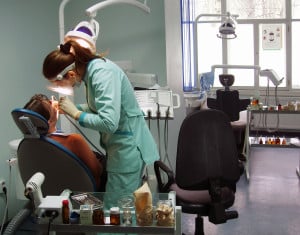
Regular visits to the dentist are crucial for keeping your teeth and gums clean and identifying possible oral health problems in the early stages. But did you know that your dentist may be able to detect other systemic health problems — simply by examining your mouth? The dentists at Northfield Dental Group explore several diseases that may be detected during a routine dental examination.
Diabetes
Indicators: bad breath, bleeding gums
Diabetics are more likely to develop gum disease and have swollen, bleeding or receding gums or dry mouth symptoms. Experts believe this is because diabetes inhibits the body’s resistance to infection.
Crohn’s Disease
Indicators: dime-sized ulcers on the inside of the cheeks/lips
One out of five patients with this inflammatory bowel disorder develops oral lesions on the inside of the cheeks or lips. These lesions, which may have a white center with a red halo, may appear before any abdominal symptoms (e.g., diarrhea, cramps).
The mouth may reveal signs of other types of gastrointestinal distress. For example, individuals that suffer with gastrointestinal reflux disease (GERD) may have tooth enamel erosion from regurgitating stomach acid.
Kidney Disease
Indicators: chronic bad breath, unpleasant taste
Kidney malfunction will release by-products of incomplete protein breakdown; this can cause a persistent, unpleasant taste or odor in the mouth. It may also cause dry mouth symptoms.
Extreme Stress/Anxiety
Indictors: severe tooth wear
It is common for people saddled with stress or anxiety to grind or clench their teeth. Over time, this can cause extreme wear and tear on the tooth enamel; it may even result in small tooth chips or cracks. In some cases, individuals may not be aware that they grind/clench because they do it at night while sleeping. A dentist will be able to spot the signs, though!
Osteoporosis
Indicator: tooth loss/bone loss on a dental X-ray
A dental X-ray may show the early stages of bone loss. Bone loss in the jaw and around the teeth could indicate bone loss in other parts of the body. Studies have also shown that individuals with low bone mineral density are prone to tooth loss.
Baby boomers are particularly vulnerable to some of these diseases, like diabetes, and should be diligent about scheduling regular dental check-ups (as well as appointments with their primary physician).
To schedule a dental checkup with Northfield Dental Group, please call (973) 736-0111 today.




 Our Practice
Our Practice Our Doctors
Our Doctors Blog
Blog Special Offers
Special Offers Financing
Financing Testimonials
Testimonials